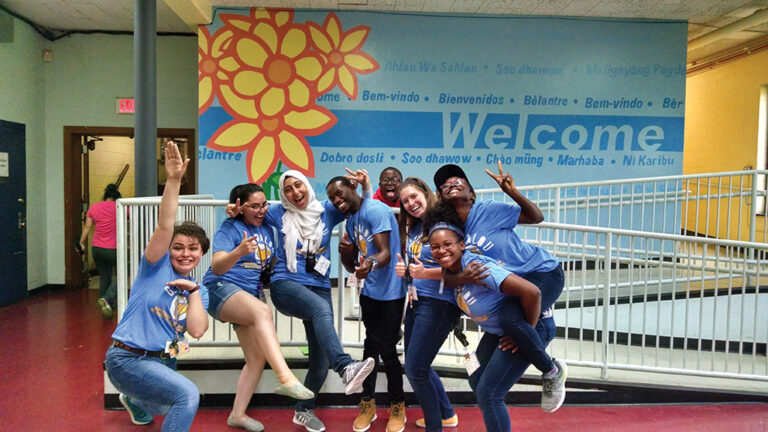Directed Field Experiences teach intentionality and design thinking
Each year, the Entrepreneurship for the Public Good (EPG) program accepts 20 first-year student applicants to an immersive program that culminates with a summer internship. Only it’s not an internship, says Dr. Peter Hackbert, EPG director. It’s a directed field experience. What’s the difference?
In a word, intentionality.
“The reason I call it a directed field experience (DFE),” Dr. Hackbert said, “is because I want the students to be intentional about their selection. Many opportunities are not advertised, and we can use our reputation, relationships and resources to help them craft something they want to explore with a community partner.”
It’s also an experience directed by Dr. Hackbert and other faculty advisors, who help students create opportunities to explore their desired fields, whether it involves graduate research, accounting, sustainable design or any number of other fields. It helps students, too, by allowing them to test out a professional position and decide whether or not it’s truly for them.
The students aren’t just getting a degree, they’re making themselves up and discerning the value they’re creating in themselves. The program reveals to them the knowledge and skills gained from entrepreneurial leadership mindsets and behaviors.
Dr. Peter Hackbert
The EPG program was established in 2002 as a two-summer, intensive learning experience to practice social entrepreneurial leadership in Kentucky and Appalachia. More than $7 million in endowed funding was raised for the program during Berea’s sesquicentennial fundraising campaign. With two endowed chairs to lead students in fostering creative problem solving and leadership, the program built upon and complemented an already existing internship program as well as the Brushy Fork Institute’s civic leadership initiatives.
The first summer after their acceptance into the program is an immersive seven-week seminar focused around design thinking, a creative problem-solving methodology developed by the Stanford d.school. During those seven weeks, the cohort for that summer studies the EPG Cycle of Abilities, a set of behaviors that enable students to be intentional in their actions by engaging complexity and uncertainty, exploring values and ethical structure, facilitating group decisions, recognizing opportunity, mobilizing resources and advocating for change.
“The students aren’t just getting a degree,” Dr. Hackbert said. “They’re making themselves up and discerning the value they’re creating in themselves. The program reveals to them the knowledge and skills gained from entrepreneurial leadership mindsets and behaviors.”
In practice, what that looks like for students between their first and sophomore years is to conduct real-life community-based field work by advancing entrepreneurship in Appalachia. The students divide into teams of five to explore opportunities in the region.
For the last several summers, EPG students have been working on bicycle tourism in Kentucky. The commonwealth has 856 miles of connected bicycle-friendly roads, ranking the state fifth nationally. In previous summers, EPG students played a role in getting approval at the state and federal levels specifically for U.S. Bike Routes 76 and 21, which cross in Berea. U.S. Bike Route 21 follows the Daniel Boone Trace and heads north beyond Fort Boonesborough to Maysville, linking a cycling route from Atlanta, Ga., to Cleveland, Ohio.
In summer 2018 the most recent EPG cohort explored ways to encourage business development along these routes.
“Dr. Hackbert gave us an assignment to create a map of all the cafes, restaurants, and places to visit in London, Ky., for cyclists,” Anna Heremes ’20 said. “He never told us how. He gave us a car and some money for food and said, ‘Go. Talk to people, to strangers, to the tourism department. In two weeks, I need a map.’ And he released us into the wild.”
“We do some element of that every year,” Dr. Hackbert said. “The business models included Airbnbs, inns and manufacturing facilities for tiny homes that could become villages for nature tourists,” he explained.
In addition to reinforcing a sense of intentionality, all the students consulted for this article said the first summer really hammered home the first item on the Cycle of Abilities list: engaging complexity and uncertainty.
“It teaches us to be comfortable with not knowing what’s going on,” Brandon Pollock ’19 said. “We learned how to overcome that positively, how to be intentional with ourselves and take control of our outcomes.”
Learning to deal with uncertainty that first summer helps students succeed in their second summer, when they do their DFEs.
“The way EPG prepared me for the DFE,” said Rodney Kimbangu ’20, who did his DFE with the New York Film Academy, “was by equipping me with the tools the first summer that allowed me to be proactive, focused and intentional with what I wanted to do with my life without knowing exactly what that was.”


